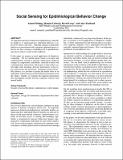Social sensing for epidemiological behavior change
Author(s)
Madan, Anmol Prem Prakash; Cebrian, Manuel; Lazer, David; Pentland, Alex Paul
DownloadPentland_Social Sensing.pdf (1.101Mb)
OPEN_ACCESS_POLICY
Open Access Policy
Creative Commons Attribution-Noncommercial-Share Alike
Terms of use
Metadata
Show full item recordAbstract
An important question in behavioral epidemiology and public health is to understand how individual behavior is affected by illness and stress. Although changes in individual behavior are intertwined with contagion, epidemiologists today do not have sensing or modeling tools to quantitatively measure its effects in real-world conditions. In this paper, we propose a novel application of ubiquitous computing. We use mobile phone based co-location and communication sensing to measure characteristic behavior changes in symptomatic individuals, reflected in their total communication, interactions with respect to time of day (e.g., late night, early morning), diversity and entropy of face-to-face interactions and movement. Using these extracted mobile features, it is possible to predict the health status of an individual, without having actual health measurements from the subject. Finally, we estimate the temporal information flux and implied causality between physical symptoms, behavior and mental health.
Date issued
2010-09Department
Massachusetts Institute of Technology. Engineering Systems Division; Massachusetts Institute of Technology. Media LaboratoryJournal
Proceedings of the 12th ACM International Conference on Ubiquitous Computing, Ubicomp '10
Publisher
Association for Computing Machinery
Citation
Madan, Anmol et al. “Social sensing for epidemiological behavior change.” ACM Press, 2010. 291.
Version: Author's final manuscript
ISBN
978-1-60558-843-8